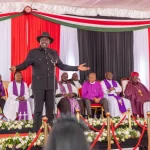The Kenya Editors’ Guild (KEG) has sharply condemned a directive by the Communications Authority of Kenya (CA) banning live broadcasts of the June 25 protests.
In a statement on Wednesday, KEG termed the CA’s action as unconstitutional, noting that it misinterprets Articles 33 and 34 of the Constitution, which guarantee free expression and media freedom.
KEG President Zubeidah Kananu termed the directive “legally and factually flawed”, saying it was an affront to press freedom and public accountability.
“CA’s claim that it is acting under Articles 33 and 34 of the Constitution is legally and factually flawed. These provisions protect free expression, with clear limits only on hate speech, incitement, and propaganda, not on responsible journalism,” KEG said.
The Guild cited a 2023 High Court judgment in Kenya Editors’ Guild & Others v Communications Authority & Others, in which the court ruled against state interference in live media broadcasts and emphasised that no government agency can impose prior restraint on the press.
“By ignoring this ruling, CA is actively undermining judicial authority and reopening the door to unconstitutional state censorship,” President Kananu noted.
KEG called for the immediate withdrawal of the directive, respect for the court orders, and reinforcement of the public’s right to know as it urged media houses to stand firm and consider legal protection if threatened.
“During moments of civic unrest, the only crisis greater than the protest itself is the silencing of the voices that tell its story,” said Kananu.
At the same time, the Law Society of Kenya (LSK), the Police Reforms Working Group, and the Kenya Medical Association also censured the CA directive, warning of its implications on constitutional rights, emergency response, and the potential misuse of state power.
“This directive is a misinterpretation of constitutional provisions and a dangerous step towards suppressing fundamental freedoms in Kenya,” the joint statement read.
The groups said the move not only violates Article 34 of the Constitution but also the November 2024 court ruling that declared CA’s earlier broadcast interference unconstitutional, affirming that only the Media Council of Kenya has regulatory authority over media content.
“Live broadcasts serve a crucial role in a democratic society… preventing the spread of misinformation and rumours,” the statement added.
They warned that the order is already affecting medical response to injured protesters, bystanders, and law enforcement officers, further violating the right to safety under Article 29 of the Constitution.
“We remind the CA that the media acts as a watchdog… Live broadcasts can deter excessive force and human rights violations by ensuring that actions are witnessed and recorded,” they said.
The three organisations further put the CA and its CEO on notice of imminent legal action if the directive is not rescinded by 4 pm, adding that any move to shut down the internet would also breach standing conservatory court orders.
“We urge national media stations to remain guided by Kenyan law and recent judicial rulings, as well as keep Kenyans informed to prevent atrocities under the cover of a ban.”
CA had directed all television and radio stations to immediately cease live coverage of the ongoing protests.
In a circular addressed to “All Television and Radio Stations,” the authority cited Articles 33(2) and 34(1) of the Constitution and Section 46I of the Kenya Information and Communications Act of 1998 as the basis for the order.
“The live coverage of the June 25, 2025, demonstrations is contrary to Articles 33(2) and 34(1) of the Constitution of Kenya,” read the directive signed by CA Director General and CEO David Mugonyi.



